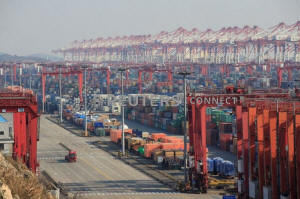U.S.-China trade deal cuts tariffs for Beijing promise of big farm
purchases
 Send a link to a friend
Send a link to a friend
 [December 14, 2019]
By Andrea Shalal, David Lawder and Stella Qiu [December 14, 2019]
By Andrea Shalal, David Lawder and Stella Qiu
WASHINGTON/BEIJING (Reuters) - The United
States and China cooled their trade war on Friday, announcing a "Phase
one" agreement that reduces some U.S. tariffs in exchange for what U.S.
officials said would be a big jump in Chinese purchases of American farm
products and other goods.
Beijing has agreed to import at least $200 billion in additional U.S.
goods and services over the next two years on top of the amount it
purchased in 2017, the top U.S. trade negotiator said Friday.
If the purchases are made, they would represent a huge jump in U.S.
exports to China. China bought $130 billion in U.S. goods in 2017,
before the trade war began, and $56 billion in services, U.S. Bureau of
Economic Analysis data show.
In return, the United States would suspend tariffs on Chinese goods due
to go into effect on Sunday and reduce others, U.S. officials said. The
86-page agreement is due to be signed the first week of January in
Washington by principal negotiators.

"We have agreed to a very large Phase One Deal with China," U.S.
President Donald Trump tweeted Friday morning. Officials in China have
"agreed to many structural changes and massive purchases of Agricultural
Product, Energy, and Manufactured Goods, plus much more," he said.
Trump later told reporters at the White House that he thought China
would hit $50 billion in agricultural purchases, repeating a promise he
made to U.S. farmers in October.
At a news conference in Beijing, Chinese officials said the two sides
had agreed on the text of a deal, but offered no specific details on the
amount of U.S. goods China had agreed to buy.
U.S. markets have gyrated on rumors and leaks about the trade deal in
recent months, but were muted on Friday on the news.
The agreement was announced as the U.S. House Judiciary Committee voted
to charge Trump with abuse of power and obstruction during an
impeachment inquiry. It also followed closely on the heels of a deal
with the U.S. Congress paving the way for passage of a new North
American trade agreement.
CHINA AG BUYS
Beijing has committed to buying $32 billion more in farm products over
the next two years, or about $16 billion a year, U.S. Trade
Representative Robert Lighthizer told reporters at the White House, on
top of a baseline of $24 billion in Chinese purchases in 2017. In
addition, Beijing said it would make a big effort to spend an additional
$5 billion a year.
"To me it's an enormously important first step in our relationship,"
Lighthizer said. "This is China taking real commitments to do real
things in a reasonable period of time, that's enforceable."
He said China would be free to buy things when "it's the perfect time in
the market to buy things."
China will import more U.S. wheat, corn, and rice, China's vice
agricultural minister said on Friday, without elaborating.
China has not been a major buyer of U.S. corn, wheat or rice in the past
- though in recent years it has been the No. 3 or 4 buyer of one
particular variety of wheat, U.S. spring wheat used for blending. China
was a top 5 buyer of U.S. corn from 2011 to 2014 but has not been a
major buyer since.
Soybeans made up half of China's agricultural purchases in 2017. Demand
has since cratered because the pig herds that eat it have been reduced
by African swine fever, however.
Asked about Trump's $50 billion figure, officials in Beijing said on
Friday that details would be disclosed later.
Some American farmers said they were waiting for more.
"Is China going to live up to their commitment?" said Burton Eller,
executive director of the National Grange, an agriculture advocacy
group, and a beef cattle farmer.
[to top of second column]
|

Containers are seen at the Yangshan Deep Water Port, part of the
Shanghai Free Trade Zone, in Shanghai, China, February 13, 2017.
REUTERS/Aly Song

"Are we going to get something in black and white that says they're
going to buy this much over this much time or this kind of commodity
they're going to need?" he said.
Lighthizer said China also agreed to buy more U.S. manufactured
goods, energy and services, but provided no details. He said the
agreement included specific targets for those broad areas that would
be published later, and specific targets for specific products that
would remain classified.
The U.S. has agreed to suspend tariffs on $160 billion in
Chinese-made cell phones, laptop computers and other consumer goods
due to go into effect on Dec. 15, Trump said on Twitter. USTR said
existing tariffs on $120 billion of other goods such as smart
speakers and Bluetooth headphones would be cut to 7.5%.
A statement issued by USTR on Friday said that the United States
would leave in place 25% tariffs on $250 billion worth of Chinese
goods.
China has also agreed to suspend retaliatory tariffs, targeting
goods ranging from corn and wheat to U.S. made vehicles and auto
parts, that were due to take effect Dec. 15.
INTELLECTUAL PROPERTY PROTECTIONS
The Trump White House laid out ambitious plans to restructure the
United States' relationship with China, including addressing what a
2018 USTR investigation concluded were Beijing's "unfair,
unreasonable, and market-distorting practices," when it started the
trade war with China.
There is broad bipartisan support for Trump's drive to hold China
accountable for years of economic espionage, cyber attacks, forced
technology transfer and dumping of low-priced goods made with hefty
government subsidies.
But the agreement on Friday touches on very little of these reforms.
Negotiators from both sides will start on a new round of "Phase two"
trade talks immediately, Trump tweeted.
Friday's deal includes specific commitments on intellectual
property, technology transfer, agriculture, financial services,
currency, and foreign exchange, Lighthizer said.

The deal will provide more protection for foreign companies in China
and Chinese companies in the United States, Chinese officials said.
Neither offered details.
The Business Roundtable, a group of chief executives of the largest
U.S. companies, said "this de-escalation in trade tensions is a
positive step toward resolving important trade and investment issues
between our two nations."
Senator Chris Murphy, a Democrat from Connecticut, called it a
"total capitulation," saying China had made "zero hard commitments
to structural reform."
Lighthizer told reporters on Friday that both sides could start
negotiating on more difficult issues before the 2020 election in
November.
"This is very hard stuff," he said. "We have systems that are
different. We have to figure out a way to integrate those systems
and get it to a place where it benefits the United States more than
it does."
(Reporting by Stella Qiu, Martin Pollard, David Lawder, Karl Plume,
Mark Weinraub, Julie Ingwersen and Jeff Mason; Writing by Heather
Timmons; Editing by Nick Zieminski, Grant McCool and Sonya
Hepinstall)
[© 2019 Thomson Reuters. All rights
reserved.]
Copyright 2019 Reuters. All rights reserved. This material may not be published,
broadcast, rewritten or redistributed.
Thompson Reuters is solely responsible for this content. |